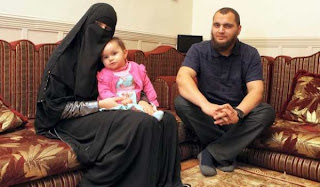“Verily, the reward of deeds depends upon the intentions, Verily, every person will get rewarded only for what he intended.” – Prophet Muhammad (pbuh)
As a female, I realize how hard it is to overcome the temptations of dressing up in a certain way. Since we’re constantly bombarded with media images telling us how to dress and how to look more appealing to others. I realize this. But I also realize a bigger reality. For this isn’t the reason why I was created. It’s not all about my looks and how others perceive me. I was created for a more noble purpose. To help make this world a better place and find my way back to my Creator. While studying some of the world religions, I realized that among the many similarities between them is in fact the religious dress code of women. It has always been about covering and not drawing attention to one’s body. In Islam, we often refer to this kind of dress code as Hijab.
Any behavior that is regularly repeated will soon turn into a habit. That’s why in Islam we are constantly encouraged to renew our intentions before taking any action. Finding meaning to hijab, which is an act of obedience to God, is essential. It shouldn’t turn into a habitual act devoid of any spiritual meaning.
There is in fact an increasingly popular trend among Muslim women these days of taking off the hijab. It might also become the norm very soon. I believe one of the main reasons girls are taking it off is because they no longer feel its essence. It has become insignificant or an unnecessary burden. Some might argue that it’s not obligatory. While others believe it is, but admit it’s a decision they’re not ready to take. Nouman Ali Khan, a Quran teacher, says about the validity of Hijab: “The ruling hasn’t changed. It’s not something that is really open to discussion and it wasn’t questionable until recently.”
So what is Hijab?
Hijab comes from the Arabic word ‘hajaba’ meaning to hide or to concel. Islamically, it often refers to the dress code of Muslim women. Khimar is another Arabic word that comes from the root word ‘khamara’ meaning to cover. Everything that covers something else is called its khimar. In accordance to the Muslim woman dress code, Khimar is the top garment (head-covering) while hijab may refer to the garment of the rest of the body. This shows that Hijab is not simply a headscarf covering the head, but it’s more than that. You can wear whatever you want making sure it doesn’t violate the Islamic guidelines of Hijab which mainly revolve around wearing loose garments that do not reveal the female’s figure.
“O you Children of Adam! We have indeed sent down to you garments to cover your shame, and (garments) for beauty but the garment of God-consciousness is the best of all..” [Quran 7:26]
So why should we wear it ?
Many Muslim women wear hijab for a number of reasons. Whether it’s for cultural reasons, parental influence, religious reasons or others. Our intention behind wearing it is what really counts. Most of us though would answer instantly when asked and say we do it for God. But the truth is, sometimes we tend to forget that and we keep it on out of habit or out of fear of being judged by others. According to Islam, we wear it not because it forces men to respect us; and not to save our beauty for them, not to make ourselves less of a trial for men: they’re not even part of the equation. We do it because God told us to do so, not because we saw benefits in it either. On a personal level, I also see it as a test. A test from the Most Beautiful. Among God’s countless blessings is the fact that He made all women beautiful.
And no doubt – we all love our beauty to be recognized.
But I believe our obedience is actually being tested.
“Do the people think that they will be left to say, “We believe,” without being put to test? [Quran 29:3]
The word Islam bears within its meaning ‘peace and submission’ , coming from the same root word as Salam, ‘Salam and Isteslam’ respectively. So it basically means that by submitting your will to God you’ll be at peace. That is what Islam is about, submitting our standards to God’s standards. And truth be told, it’s not as easy as it sounds.
It’s important to mention that Hijab is not the only way by which women could worship God. However, it is still an act of worship we’re commanded to be engaged in.
As Maryam Amirebrahimi says: “Worship comes in such a variety of forms. Being a housewife can be a form of worship. Being a stay-at-home-mom can be a form of worship. Being a working wife and mother can be a form of worship. Being an unmarried female student can be a form of worship. Being a divorced female doctor, a female journalist, Islamic scholar, film director, pastry chef, teacher, veterinarian, engineer, personal trainer, lawyer, artist, nurse, Qur’an teacher, psychologist, pharmacist or salon artist can each be a form of worship. Just being an awesome daughter can be a form of worship.
We can worship Allah in a variety of ways, as long as we have a sincere intention, and what we do is done within the guidelines He has set for us.”







